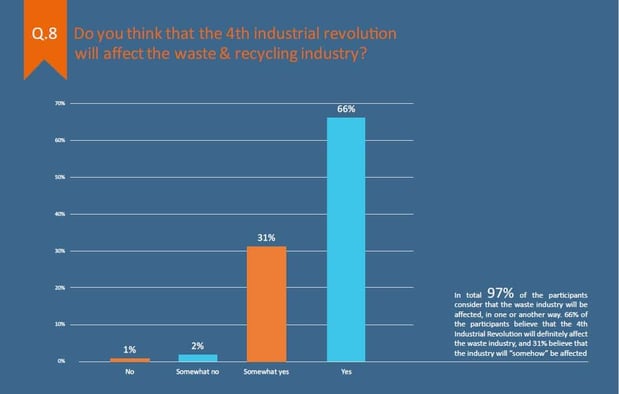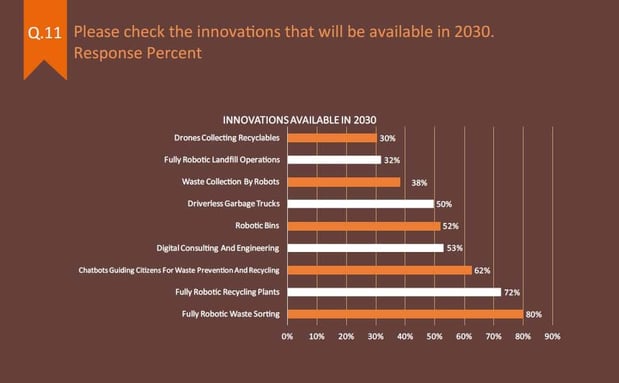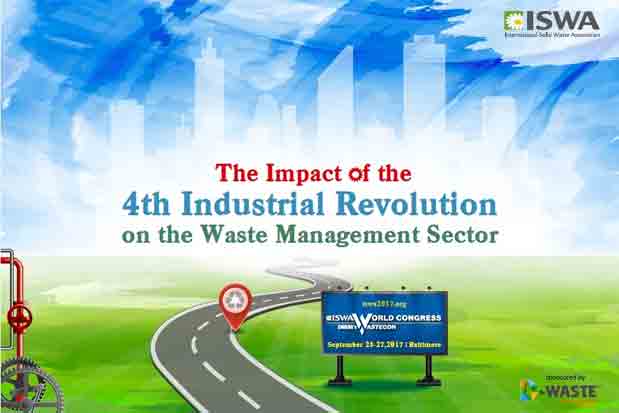The Fourth Industrial Revolution—characterized by technologies fusing the digital, physical and biological worlds, according to economists at the World Economic Forum—will significantly impact the waste management sector, concludes a new report released in conjunction with the Wastecon/ISWA World Congress 2017 last month.
Titled "The Impact of the Fourth Industrial Revolution on the Waste Management Sector,” the global analysis explores how the ongoing tech revolution will shape the future of the industry, and includes input from more than 1,000 of the waste management and recycling sector’s leading scientists, CEOs, decision-makers and other stakeholders. Of those polled, 97 percent believe waste management will be affected by ever-evolving technological advancements.
“Artificial Intelligence, Robots, Drones, Driverless Cars, 3D Printers, Internet of Things and The Revolution of Sensors, Decentralized Energy, DNA Engineering and the Rise of Bio-economy create a new landscape that will reshape manufacturing,” International Solid Waste Association (ISWA) President Antonis Mavropoulous writes in the worldwide survey’s introduction. “It will also reshape waste management and recycling too, redefining the meaning of “waste,” creating new technologies, delivering robotic solutions and driverless collection patterns.”

Among its findings, he continues: that just 14 percent of participants consider themselves to be knowledgeable about the Fourth Industrial Revolution; its speed and depth are “underestimated;” and great hope exists among the industry’s leaders that it will help resolve various waste management challenges, from waste prevention and eco-design to the circular economy of plastics.
“We wanted to make the industry aware that a huge shift is coming,” he further explained to Waste Today. “If waste management industry thinks it will be kept out, they are making a big mistake.”
The waste management World Congress—a joint partnership between Silver Spring, Maryland-based Solid Waste Association of North America (SWANA) and Wein, Austria-based ISWA—was held in Baltimore Sept. 25 through 27.
The study also discovered industry leaders evenly split about whether this modern revolution would significantly manifest itself by 2030—with projected innovations including drones collecting recyclables, robotic landfill operations, robotic waste collection, driverless garbage trucks, and robotic bins, among others. What it does make crystal clear, however, is that most insiders agree change is indeed coming.

“The survey highlights the hope that the Fourth Industrial Revolution will deliver solutions to several challenges related to waste management, from eco-design to waste prevention and circular economy around the world,” continued Mavropoulos.
Perhaps one of the most interesting results of the survey pertain to anaerobic digestion, discovering that 80 percent of participants agreed the Fourth Industrial Revolution will make the so-called “circular economy”—a regenerative and restorative economy, whereby waste and its negative impacts are eliminated by renewable energy sources, according to the nonprofit Ellen MacArthur Foundation—a reality for most consumer goods.
“Today as it was at the beginning of the XIX century, the inhabitants of this small and resource-scarce planet, are witness of the dawn of a new era,” Atilio Savino, ISWA Board member representing the Regional Development Network of Latin American, explained in the report. “The 4th Industrial Revolution and what it means in terms of a new economy, the circular one, demands a society oriented in the creation of resources instead of generating waste.
“Albert Einstein told us that we must think in a different way if we would like to change the status quo,” he continued. “The solid waste sector could be fundamental in paving the way of the transition to the new economy. Waste should be redefined and the products should be designed to be part of the industrial metabolism that will copy the biological metabolism of nature.”
Firms already committed to anaerobic digestion—the process by which food and other organic waste is processed and transformed into energy—are already benefitting from the convergence of tech and waste management. If the study is any guide, those who haven’t yet embraced tech’s contributions to the industry such as these (with many more to come) should be prepared for a new way of doing business.
“The Fourth Industrial Revolution will impact upon all industries and waste management won't escape this,”the ISWA stated in a press release announcing the report’s findings. “It made clear that the industry must respond in an integrated and comprehensive manner, involving all stakeholders of the global polity.”
Among those in the industry already on the cutting-edge of tech and waste management’s convergence and leading the charge for a cleaner, healthier world is Yaphank-based American Organic Energy (AOE). AOE will accept 180,000 tons of food waste annually, along with 30,000 tons of oils, fats and greases, and even an additional 10,000 tons of grass clippings. The energy company has also agreed to process organic waste from Brooklyn, utilizing its state-of-the-art anaerobic digester. The deal with New York City comes as officials announced plans to expand both its residential and commercial organic waste collection program under its much-heralded Zero Waste Initiative.
The city has already announced a lofty goal of reducing New York City waste by 90 percent. The program is part of a much larger effort to reduce greenhouse gas emissions from landfills, where tons of food scraps sit and decay.
Energy firms across the country, including AOE, have plans to transform food scraps and other organic materials into fuel that can power fleets of trucks, biogas that can power its facilities, and organic lawn fertilizers to help the global environment—among many other eco-friendly benefits.
Not only do these initiatives cut down on waste and help eliminate landfills and its toxic effects, but such facilities help safeguard our planet’s collective future, one food scrap at a time.
As the aforementioned eye-opening waste management and recycling report outlines, the Fourth Industrial Revolution will have profound impacts on this all-important industry, and with these, tremendous opportunities for growth, innovation, and the further proliferation and utilization of renewable resources.
As the extraordinary green energy capabilities of American Organic Energy and other anaerobic digester facilities clearly demonstrate, in some ways, this future has already arrived.
A full version of the study "The Impact of the Fourth Industrial Revolution on the Waste Management Sector” is available to read and/or download through ISWA’s website at iswa.org.








